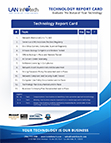How to Ensure Business Continuity Amidst the Coronavirus Scare
Does your South Florida business have a business continuity plan in place in light of the recent coronavirus outbreak? Learn more about how to create one here.
As we enter into the second half of March, cases of coronavirus in the United States are mounting day by day. Seattle, large cities in California, and New England cities like Boston and New York have significantly been affected by the insidious virus.
Slowly, experts warn that the rest of the United States will be affected as well. Medical professionals caution that there are not enough ventilators and hospital beds to take care of the spike in severe cases that may occur. No one wants a scenario similar to what’s going on in Italy, Spain, and Iran right now. No one wants what happened in China to occur in the United States.
But will it?
This remains to be seen. For the time being, individuals and businesses alike are being forced to make difficult decisions about whether they will continue on with daily operations or not. If you have a company in South Florida, you are without a doubt wondering how you are going to weather this incredible storm that is poised to hit the United States.
In the following post, we aim to help you make sense of what is currently going on with the coronavirus pandemic. We will also attempt to advise you on steps you can take to mitigate the damage done to your business — most importantly, by employing an effective disaster recovery and business continuity plan.
What is coronavirus?
Coronavirus is a highly contagious virus, somewhat similar to influenza. This specific strain of the virus (known as COVID– 19), originated in China in the province of Hubei. The city of Wuhan (within the Hubei province) was most affected, experiencing approximately 7,000 deaths from the illness and almost 200,000 infections.
Symptoms of the illness include shortness of breath, a chronic cough, and a high fever. Amazingly, the disease seems to spare the young, but those with compromised immune systems as well as the elderly (those over the age of 65), are most severely affected. Many of these individuals are at risk of requiring hospitalization if they get the disease, which again, is highly contagious.
It is also worth noting that even if you are young, you can still get the coronavirus. You may not know that you have it, however, and have just a few sniffles. Yet, even then, you may spread the disease to others.
While many people have been following the coronavirus pandemic since January, some Americans are just getting wind of the weight of this pandemic now. If this is the case for your business, forget about lost time, and make use of the short amount of time you have now to effect change in your business and prepare for the worst. Adaptation is the only thing that South Florida businesses can do now to make it through this crisis.
How can you plan for the coronavirus fallout?
Inevitably, coronavirus will affect your South Florida business. This means that the most critical step you can take now is to get a business continuity plan in place — if you don’t have one already.
For most businesses, this will mean first ensuring the safety and security of your employees. You may consider allowing your employees to work from home, if possible. You should also make sure that all employees are aware of social distancing practices, the importance of handwashing and general hygiene, and the nature of how this virus spreads (through close contact with those who have it and even on hard surfaces).
Next, you’ll want to ensure that your communications and data are secure. Speak with your IT services provider to double-check that you have a secure backup of all of your data and network preferences. Likewise, ensure that you have backup generators for energy, if necessary. You should know how you are going to continue operations or limit them if you will have less workforce and/or demand your products or services.
LAN Infotech can help. Our IT services include business continuity support. Contact us today at 954-717-1990 to learn more.

LAN Infotech is a Microsoft Cloud Services Provider, IT Managed Support company and a leader in helping law firms, nonprofits and medical organizations deploy cloud solutions, manage computer networks, keep data protected and top technology management company. Businesses like yours need technology support to run highly-effective organizations.


